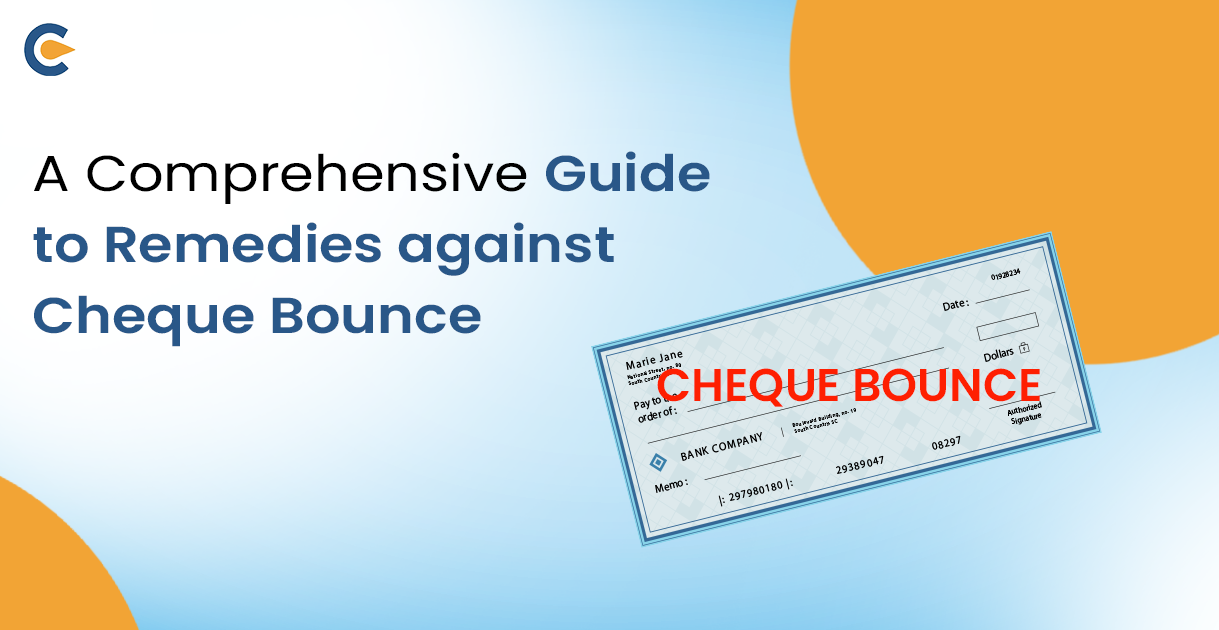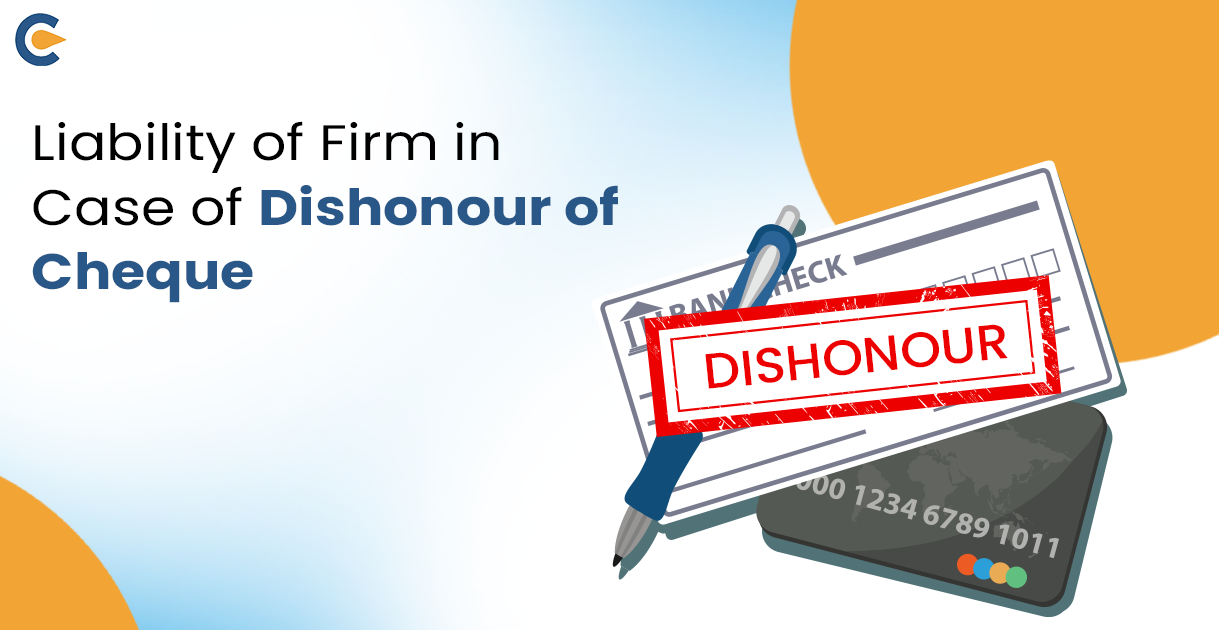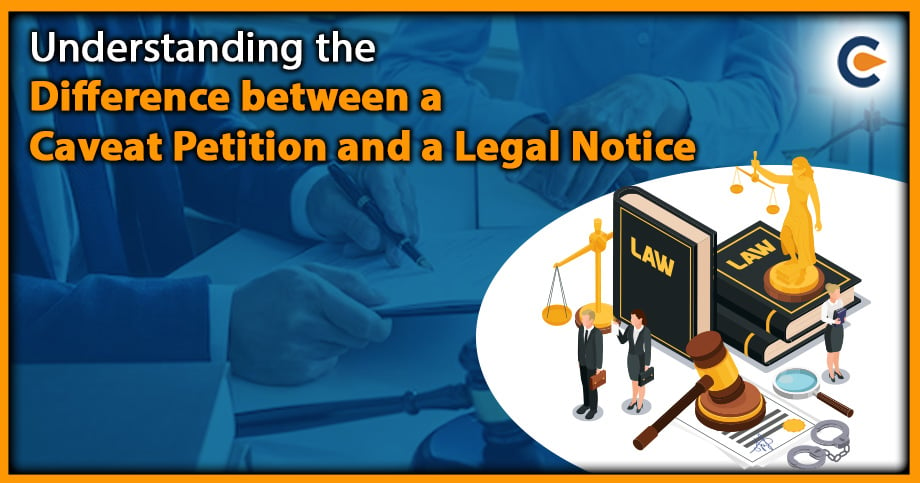Cheques offer a safe way to make payments. Compared to carrying significant quantities of cash, they can be monitored, and the signature on the cheque can be confirmed, lowering the risk of fraud. A tangible record of a financial transaction is provided by cheques. A copy of the cheque is sent to both the payee and the payer, serving as verification of payment. Accounting, taxation, and dispute settlement may all benefit from this. For recipients who might not have instant access to computerized financial services, cheques are convenient. They may be especially important for people or companies operating in isolated locations with inadequate financial infrastructure.
The reasons behind cheque bounce, and remedies against cheque bounces will all be covered in this blog.
What is a Cheque?
Since cheques are a convenient alternative to cash, they serve as a medium of exchange that encourages cashless transactions. People prefer to use cheques when making large or expensive transactions in order to reduce risk.
What do you mean by Cheque Bounce?
When a cheque bounces because there isn’t enough money in the drawer’s account to cover the cheque amount, Section 138 of the Negotiable Instruments Act is triggered. The payee may require that the cheque be resubmitted if the cheque bounces for any reason other than inadequate money. In such a case, no notice of the bounce will be sent. Both the issuer and the recipient may experience annoyance and financial loss as a result of cheque bounce. Precautions must be taken in order to prevent cheque bounces and to be aware of the repercussions of dishonoured cheques. There are a few remedies against cheque bounce in case the situation arises.
Reasons for Cheque Bounce
There are various reasons for cheque bounce. Some of the common reasons for cheque bounce are:
- In the event that there is a discrepancy between the signature on the cheque and the bank’s signature.
- If, after three months, the cheque is not given to the bank. For example, if the drawer issued the cheque on January 2, 2023, the payee is required to produce it to the court by April 2, 2023, which is three months later.
- In the event that the drawer’s account number is incorrect.
- The cheque will be dishonoured or bounced if it contains overwriting, corrections, scribbles, etc.
- If the payee’s name is unclear or not included on the cheque, the cheque will be returned unpaid or dishonoured.
- The cheque will be returned if the amount stated, and the wording doesn’t match.
- If the drawee’s bank is ordered by the court to cease payments.
- If the payee submits the cheque before the drawer closes the account, the cheque will be returned unpaid or dishonoured.
- The bank may refuse the cheque or dishonour it in the event of the drawer’s demise, insanity, or insolvency, and the drawer is informed of the same.
- The dishonour of the cheque may occur if there is insufficient balance in the drawer’s account.
The above-mentioned are some key reasons for which the cheque bounce often happens. The Indian legal system also has remedies against cheque bounce to protect the rights of the parties.
What are the punishments for Cheque Bounce?
Along with remedies against cheque bounce, there are punishments for cheque bounce, too. Once the court receives the complaint, an affidavit, and a paper trail, it will issue a summons and schedule a hearing. If convicted, the defaulter may be subject to a fine equal to twice the amount of the cheque, a prison sentence of up to two years, or perhaps both. The bank also has the authority to cancel the account and stop allowing users to use a cheque book in cases where there are several instances of returned cheques.
The drawer will not have violated any laws if they settle the remaining sum on the cheque within 15 days of receiving the notification. If not, the payee may submit a complaint in the jurisdictional magistrate’s court within one month of the notice’s 15-day deadline expiring.
Remedies against Cheque Bounce
In order to recover the amount specified in the bounced cheque, the payee has many options for remedies against cheque bounce. Some of the remedies against cheque bounce are:
- Issuing a Legal Notice: One of the Remedies against cheque bounce is the legal notice. When handling a bounced cheque, the first step is to serve the drawer with a legal notice requiring payment of the cheque amount within 15 days of the notice being sent. The legal notification needs to specify exactly what happens if payment is not made, especially if criminal procedures are started.
- Filing a Criminal Complaint: The next remedy against cheque bounceis to file a complaint. In accordance with Section 138 of the Negotiable Instruments Act, the payee may file a criminal complaint against the drawer if the latter fails to make the payment within the allotted 15 days of receiving the legal notification.
- Attending Court Proceedings: In the event that a criminal complaint is filed, the drawer and the payee are required to appear in court. If the drawer is found guilty, the court may impose punishments, including as jail time and payment to the payee. This is the next remedy against cheque bounce available.
- Filing a Civil Suit: The payee can pursue recovery of the cheque amount through a civil suit in addition to criminal procedures, so the next remedy against cheque bounce is a civil suit. The payee may request a court decree through civil litigation. There are other ways to recoup the sum with it, like the characteristic of the drawer attached.
- Settlement by Negotiation: In certain situations, a settlement may be reached outside of court between the payee and the drawer through the negotiation of a payment schedule or a compromise. Theseremedies against cheque bounce arequicker methods to handle the situation.
- Reporting to Credit Bureaus: The payee may report a rejected cheque to credit bureaus if the drawer is a repeat offender or continues to withhold payment even after taking legal action. The drawer’s credit score and financial reputation may suffer as a result.
Why are Remedies against Cheque Bounce useful?
Some of the reasons why remedies against cheque bounce are useful are:
- The remedies against cheque bounce act as a legal deterrence.
- The credibility is protected with the remedies against cheque bounce.
- The remedies against cheque bounce ensure fairness.
- The financial disputes can be minimized with remedies against cheque bounce.
- The remedies against cheque bounce give consumers confidence.
- Small businesses are supported with remedies against cheque bounce.
- The remedies against cheque bounce encourage responsibility.
- The financial discipline can be maintained with remedies against cheque bounce.
- Adherence to legal rules and regulations can be seen with remedies against cheque bounce.
- The remedies against cheque bounce also promote financial accountability.
- The integrity of transactions can be protected with remedies against cheque bounce.
Precautions to Avoid Cheque Bounce
The precautions to avoid cheque bounce are:
- Sufficient fund maintenance: Before writing a cheque, issuers should confirm that their account has enough money in it.
- Using accurate information: The issuer must include accurate information on the cheque, such as the date, amount, and payee name.
- Avoiding post-dated cheques: Post-dated cheques increase the likelihood that they may bounce; hence, issuers should refrain from issuing them.
- Verifying the signature and date: To make sure the cheque is legitimate, the recipient should verify the signature and date on the cheque.
New Rule for Cheque Bounce
In early August 2021, the Reserve Bank of India (RBI) issued a notification stating that anyone who wants to use or significantly rely on cheques must keep a minimum amount in their bank account in order to prevent cheques from bouncing. The client who issued the cheque can be penalized if this balance is not maintained.
In addition, the RBI implemented a National Automated Clearing House (NACH) operating schedule that is applicable to all national and private banks and runs around the clock. The purpose of this rule is to simplify and speed up the cheque clearance procedure. The fact that NACH is open seven days a week means that cheques may be processed and cleared at any time of the week. Furthermore, as the recent Supreme Court decision on cheque bounce makes clear, dishonouring a cheque is illegal under Section 138, which carries a two-year maximum jail sentence or a fine double the value of the cheque. The person who wrote the cheque may have previously paid off some of the debt and may have even offered a post-dated cheque as security in court.
Important Amendments in Relation to Cheque Bounce
The Negotiable Instruments Act has undergone several revisions throughout time. This simplifies and speeds up the process of resolving issues involving bounced cheques. Among the significant changes are:
| Section 142A Introduction | This section mandates that a complaint be filed within 30 days after receiving a bank letter stating that the cheque has been returned as unpaid. |
| Authority to File Complaint | The location where the cheque was dishonoured establishes the authority to file a complaint under Section 138. |
| Sections 143A and 148 | Section 143A and 148were included in order to provide the payee with interim compensation and punitive interest while the matter is still pending. |
Professional Assistance with Corpbiz
An advocate or attorney for the party must submit a legal notification on its behalf. Therefore, you must first get in touch with a knowledgeable advocate at Corpbiz in order to provide a written notification of a cheque bounce. Since a cheque bounce notification is the first step in initiating a lawsuit procedure, it is highly recommended that you hire a lawyer for cheque bounces. The Corpbiz team has the requisite knowledge and expertise to create these legal notices. In order to ensure that you are taking the required steps to pursue justice, our professionals will be able to gather important information for you and provide appropriate notice. Corpbiz can effectively manage all legal paperwork.
Frequently Asked Questions
What is a bounced cheque?
When a person writes a cheque, and the bank on which it is drawn refuses to accept it for any reason insufficient money, for example—it is called a “cheque bounce.” Legal and financial repercussions may follow for both the recipient and the cheque's issuer in this situation.
What are the remedies against cheque bounce?
Depending on the jurisdiction, a bounced cheque may result in different legal repercussions, but generally speaking, the issuer of the cheque may be subject to jail time, fines, and criminal prosecution. In order to collect the outstanding money, the recipient of the bounced cheque may also file a lawsuit or, if appropriate, start legal actions under the Negotiable Instruments Act.
When a receiver receives a cheque that bounces, what can they do?
In order to retrieve the money due, the recipient of a failed cheque may file a lawsuit or start legal processes under the Negotiable Instruments Act. Furthermore, the recipient has the option to serve the cheque issuer with a legal notice requiring payment of the unpaid balance within a given time frame.
Is cheque bouncing a crime?
Indeed. It is illegal when a cheque bounces due to inadequate money in the bank account. In accordance with Section 138 of the Negotiable Instruments Act of 1881, the payee may bring a criminal complaint. The cheque writer may go to jail if a criminal complaint is made.
How much is the bail in the case of the bounced cheque?
In the case of a cheque bounce, the bail amount varies from case to case. The amount of bail is determined by a variety of factors, including the amount for which the cheque was written, the number of related cases that are still outstanding against the drawer in the same transaction, the drawer's financial situation, etc.
What is the cost of the penalty for a bounced cheque?
A bank-to-bank fee for cheque bounces ranges from Rs. 50 to Rs. 750.
Is it possible for me to report a cheque bounce?
Indeed, you have the right to report the individual who gave the cheque in a formal complaint. Then, a person may bring a complaint in a criminal court against the cheque issuer under Section 420 or 406 of the Indian Penal Code (IPC).
Can a bank impose fees on a cheque that bounces?
Yes, depending on the bank and the kind of account, most banks charge a fee for a cheque that bounces. The cost can be added to any financial or legal repercussions and is often taken out of the cheque issuer's account.
How can someone prevent a bouncing cheque?
A person should make sure they have enough money in their bank account to cover the value of the cheque in order to prevent a cheque from bouncing. Additionally, they should confirm that the cheque is neither post-dated nor stale-dated and that they have provided the right date, signature, and other information.
Can someone who bounces a cheque go to jail?
Indeed, in certain countries, the issuer of a bounced cheque may face an incarceration sentence; however, this is often limited to situations involving repeated offences or substantial sums of money.
What is a cheque return memo?
When a cheque is returned unpaid, the bank notifies the sender in writing, providing the cause for the return, the date the cheque bounced, the cheque number, and the date the cheque was issued. To issue a cheque bounce notification, you must have this memo, which is known as a cheque return memo. Based on the bank's cheque return memo, the payee may send out a notice that a cheque has bounced.
If the cheque bounces once, may I submit it to the bank again?
Yes, even if the cheque bounced once, you can still return it to the bank. If a cheque is dishonoured once or twice, it does not affect your ability to transmit the cheque to the bank to be paid. On the other hand, if you produce the cheque and it is returned unpaid once again, you will have grounds to file a complaint under Section 138.
Can I send a notice of cheque bounce without hiring a lawyer?
No, it's strongly advised that you obtain legal counsel before issuing a legal notice.
In the event of a cheque bounce, may I be arrested?
Since it is a criminal offence, you may be arrested if the cheque you wrote bounces due to inadequate money in your account. The purpose of the penalty of jail is to prevent dishonest individuals from deceiving innocent people about payments and from escaping or leaving the nation. But it's an offence for which bail is required. Therefore, if you promise to appear in court when required, you may be granted bail.
In the event that a cheque bounces, are criminal and civil processes possible?
Absolutely, in the event that a cheque bounces, the issuer may face both civil and criminal penalties. Either criminal or civil procedures may be started by submitting a complaint to the magistrate in accordance with Section 138 of the Negotiable Instruments Act.
Read Our Article: How To Send A Legal Notice For Cheque Bounce?











